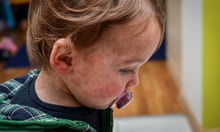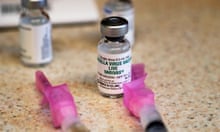Measles cases worldwide rose by 300% during the first three months of 2019 compared with the same period last year, the World Health Organization (WHO) has said, amid growing concerns over the impact of anti-vaccination campaigns, particularly spread through social media.
Measles, which is highly contagious, can be entirely prevented with a two-dose vaccine, but for some time the WHO has been warning about declining global vaccination rates.
“Preliminary global data shows that reported cases rose by 300% in the first three months of 2019, compared to the same period in 2018. This follows consecutive increases over the past two years,” it said in a statement.
“While this data is provisional and not yet complete, it indicates a clear trend. Many countries are in the midst of sizeable measles outbreaks, with all regions of the world experiencing sustained rises in cases,” the WHO added.
The agency noted that only about one in 10 actual measles cases were reported, meaning the early trends for 2019 were likely to underestimate the severity of the outbreaks.
So far this year, 170 countries have reported 112,163 measles cases to the WHO. At this time last year, 163 countries had reported 28,124 cases.
“Spikes in case numbers have also occurred in countries with high overall vaccination coverage, including the United States,” the WHO said. “The disease has spread fast among clusters of unvaccinated people.”
The New York mayor, Bill de Blasio, declared a public health emergency in parts of Brooklyn last week after a measles outbreak in an ultra-Orthodox Jewish community, where some distrust modern science and technology, leaving them vulnerable to anti-vaccine scaremongering. More than 300 cases of measles were reported. The state of emergency required families to have their children vaccinated or pay a fine. Some members of the ultra-Orthodox community have filed a lawsuit, claiming the declaration is unjustified.
Israel, Thailand and Tunisia have also experienced alarming outbreaks among unvaccinated groups, despite generally high levels of vaccination coverage, said the WHO. Last month, Unicef warned about the surging numbers of measles cases worldwide and the disastrous consequences for children.
While there are many reasons for the fall in vaccination rates, including supply problems and conflicts in some parts of the world, there is serious concern about the spread of anti-vaccine misinformation, leading to what public health experts call “vaccine hesitancy”.
The internet has spread conspiracy theories and anti-pharmaceutical industry stories across Europe, where there has been major declines in immunisation rates. In some countries, including Italy and France, populist politicians have championed the right of parents not to vaccinate a child – even though 95% immunisation is necessary to prevent vulnerable children who cannot be vaccinated because of a compromised immune system from falling ill with potentially serious consequences.
Unicef said 98 countries reported rising numbers of measles cases in 2018 compared with 2017, including some that had eradicated the disease. Ukraine, the Philippines and Brazil had the biggest increase in numbers.
But there is also concern over Africa, which has less vaccine coverage than other regions. WHO says its Africa region had the biggest rise in cases in the last three months compared with the same time last year – a 700% increase.









